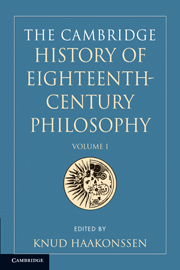Book contents
- Frontmatter
- CONTENTS
- Preface
- Methods of reference and abbreviations
- List of contributors
- I The Concept of Eighteenth-Century Philosophy
- II The Science of Human Nature
- 7 Philosophical Methods
- 8 Human Nature
- 9 Perception and Ideas, Judgement
- 10 Self-Consciousness and Personal Identity
- 11 Reason
- 12 Substances and Modes, Space and Time
- 13 Causality
- 14 Knowledge and Belief
- 15 Scepticism
- 16 Philosophy of Language
- 17 Rhetoric
- 18 Aesthetics
- 19 The Active Powers
- 20 Education
- Biobibliographical Appendix
- Bibliography
- References
18 - Aesthetics
from II - The Science of Human Nature
Published online by Cambridge University Press: 28 March 2008
- Frontmatter
- CONTENTS
- Preface
- Methods of reference and abbreviations
- List of contributors
- I The Concept of Eighteenth-Century Philosophy
- II The Science of Human Nature
- 7 Philosophical Methods
- 8 Human Nature
- 9 Perception and Ideas, Judgement
- 10 Self-Consciousness and Personal Identity
- 11 Reason
- 12 Substances and Modes, Space and Time
- 13 Causality
- 14 Knowledge and Belief
- 15 Scepticism
- 16 Philosophy of Language
- 17 Rhetoric
- 18 Aesthetics
- 19 The Active Powers
- 20 Education
- Biobibliographical Appendix
- Bibliography
- References
Summary
Aesthetics in the broad sense goes back at least as far as Plato’s speculations about different types of beauty and the value of the arts. It is not until the eighteenth century, however, that aesthetics as distinct from traditional philosophical reflection on art comes into its own. This new discipline of aesthetics is more inclusive than a philosophy of the arts per se because it is concerned primarily with the appreciation of the sensory aspects of experience, whether derived from nature or the arts. Nature is also considered in terms of its ability to arouse aesthetic pleasure. In fact, some eighteenth-century thinkers found the purest instances of beauty and sublimity in the contemplation of nature. The variety of aesthetic responses that humans exhibit in relation to both nature and art required a philosophical and psychological reexamination of the human cognitive and critical faculties – one that would give feeling and imagination a larger role than before. Moreover, insofar as aesthetics raises the question of taste, it addresses social conventions concerning fashion, human manners, and other cultural practices that are contiguous with the arts.
The new discipline of aesthetics also introduces a more systematic consideration of the arts themselves. Whereas traditional reflections on art by Plato, Aristotle, Augustine, and others tended to deal with only some of the arts and mainly in terms of their import for philosophy and theology, we now see an increased consideration of the inherent character and unity of the fine arts. As noted by Paul Kristeller in his essay on ‘The Modern System of the Arts’, the modern notion of the arts as the fine arts – the arts of poetry, painting, sculpture, architecture, music, and dance – only came into being at the beginning of the eighteenth century.
- Type
- Chapter
- Information
- The Cambridge History of Eighteenth-Century Philosophy , pp. 516 - 556Publisher: Cambridge University PressPrint publication year: 2006



